Hello friends,
For this installment of the Conversations Series, I’m talking with Lora Mathis. Lora’s one of my favorite people in the world. Her writing is excellent. She’s very smart and considerate, and she’s one of the best tour-mates a guy could ask for.
Lora’s books are essential reading for the times we’re in. Latest one, The Snakes Came Back, was released last year by Metatron Press. I highly recommend picking it up. There’s also Here I Am In It, which Burn All Books released a couple years ago. It’s outstanding, but because it’s out of print, it’s completely impossible to find. (Still, you should look. It’s worth your time.) Definitely grab the e-book edition of Lora’s Party Trick Press book, The Women Widowed to Themselves. (You can find that here.) There’s also a tape of Lora’s poetry I released. Get that here. Find all of these if you’re able. Lora’s work is vital, human, and very well written.
About this series: The Conversations Series is what it sounds like—transcribed conversations with people I like. Not interviews. Not journalism. Just a nice, in-depth talk about whatever’s going on in our lives. These come out Sunday afternoons or Sunday nights because Sunday afternoon/night feels like a good time to read a long talk between two friends.
Other quick things
-My audio book record label, Hello America, has announced preorder for a collection of poems on cassette by Zenaida Smith. The tape and the chapbook are available here. It feels like a volcano, a piece of ripe fruit, and a burning house. I love it. Very proud to have helped get it out into the world.
-Big loving congratulations to Hello America artist and wonderful human being Mugabi Byenkya, who has been named a 2024 MacDowell Fellow, joining the sweet chorus of James Baldwin, Audre Lorde, Willa Cather, Ross Gay, and others. Listen to Mugabi’s poems here.
-I’m reading Andrew Zonneveld’s All Will Be Equalized: Georgia’s Freedom Seekers of the Swamps, Backwoods, and Sea Islands 1526-1890. I saw Andrew give a talk yesterday at the ECM in Lawrence, Kansas, and recommend his work wholeheartedly. Especially as we roll up to Trump’s second presidency, intelligently written and researched documentation of radical dissent from an anarchist perspective are much needed. Buy this book. It will give you strength for what’s ahead.
Okay, I hope you’re all well and taking care of each other. This particular timeline is exhausting, shitty, and painful. I’m trying my best and I hope you are too.
With love,
-Adam Gnade
ADAM GNADE + LORA MATHIS
AG: Hey Lora, what are you up to today?
LM: I’m sitting on my bed wearing a polka dot bathrobe and reading Bernadette Mayer’s Midwinter Day.
I’m taking a poetry workshop where we read the book and prepare to write our own book-length poem. It’s my first time reading it, and it’s a different angle to read not only for content or craft but for strategy too. I’m also reading to investigate how she wrote a book in a day.
In a bit I’ll get up and go out to the back studio Mando and I share. I’m working on applications for grad school. I’m throwing my name in the pile and applying for MFAs. The first one is due in three days, and I’ve been constantly editing and rewriting a statement of my purpose. It’s exhausting. I’m so sick of talking about myself. But the writing has become much sharper, and I feel good about it. It feels good to be working towards this, even if I don’t get in, even if I don’t go.
I’ll probably work on that for an hour or two, then go to the YMCA. Then I’ll come back, make an Italian wedding soup with some broth I made with veggie scraps yesterday, and then work some more. In the evening I’m going to give my friend Pedro a ride to REI so they can try on some boots they want to buy.
How about you?
AG: At the moment my schedule is different than it’s ever been. Jessie and my 12 and 14 year old god-sons were in a terrible car accident a few weeks ago. Jessie had to go to the ER for a head injury, which took… well, it felt like weeks to heal, but it was maybe a week and a half of intense pain and nausea. Thankfully she’s better now. But her car’s totaled. So I’ve been waking up at 6am every day to drive out to Lawrence, Kansas and take the boys to school. I’ve always been kind of… I don’t know, maybe like a vampire? So mornings are new to me. Getting up early, going to bed at a normal time. It’s thrown me completely off balance. Of course it’s temporary. Once Jessie’s able to get another car, I’ll go back to sleeping all day and being up all night. But I’m liking mornings. It’s beautiful out here in the morning—the foggy, snowy fields, the pink and blue dawns over the woods to the east. The weirdest part is I write at night now. I’ve always written in the late afternoon after waking up at noon or so. Writing at night feels very foreign to me and the book that’s coming out of it is different than the ones I’ve written in the past. Shorter chapters. Much more political—or at least tied deeper to current events. And it’s surprisingly emotionally volatile, or maybe just emotionally charged. I feel very caught up in it when I’m working on this manuscript and I go through these… I don’t know, these intense, savage, unexpected moods and emotional fluctuations. It feels chaotic and kind of internally violent—but in a good way somehow; I’m still figuring it out. When you write these days, how do you feel?
(Photo by me of Lora and Matty Terrones doing a poetry set in LA on tour.)
LM: Oh god, I’m sorry to hear that. I’m glad she’s better now. Does your new book have new characters in it that extend beyond the universe your last work lives in? Is it set mainly in Kansas?
Lately writing has been making me feel like my brain is buzzing. It’s motivating but very hard to slow down and unwind after that. Most of the writing I’m doing is answering questions for grad school and reworking the same personal statement many many times. I haven’t been doing much creative writing. Sometimes a poem here or there, but mainly I’m outputting for another purpose.
Writing in that style is very different than writing a poem or essay, but it still feels creative. I feel more focused on the problem solving of text, and less able to experiment or play around. It’s like a game of editing and reworking details from my life into a narrative that is interesting and also continually ties to larger goals. When I went back to school, I thought I would only focus on academic research and writing about literature. I’m glad I also ended up making films and working with my hands in very tactile ways in sculpture and printmaking. And also that I wrote a lot of poems. My brain would have been buzzing all the time if all I was doing was academic writing.
(Photo by Matty Terrones of Lora and I on tour in Arcata.)
AG: The new book follows my same characters, but this one's mostly on the road. There's a bit of Kansas. A lot of Texas. A lot of Colorado. New Mexico. Oklahoma. A few San Diego chapters. The feeling of it is different, I guess. The last book, Your Friends Will Carry You Home, is kind of genteel and calm and proper. This one is very wild and angry—angry thanks to the state of the world. It's going to lose me a lot of my audience. I mean, maybe? Anyone who doesn't support Palestine is either going to change their way of thinking or peace out on me. I guess we'll see. I want to believe my audience shares my ethics, but I'm pretty far left. It'll be interesting to see what happens when this book comes out. I don't care at all, when it comes down to it. The book is good. I can tell. I think it's the best one I've written and I usually hate my books. It's good; that's all that matters to me. What's your art studio like? I remember seeing it briefly when we were on tour with Matty, but you and Mando hadn't taken it over yet. I love that whole house. It's such a good place. That back garden area is very nice.
LM: I think that’s an interesting challenge and predicament: how truthfully can you be yourself on a page before people turn away? I especially admire your writing because it always feels honest, and I know that takes courage. I struggle with this question in my own life and writing. I feel like it has shaped how I write because early on I focused on emotional abuse, power dynamics, self-harm, and suicidal thoughts. I was terrified of how people would react, especially my family and friends. But the alternative felt like not writing what I really wanted to say. It felt like the stakes were very high internally—have the courage to speak or keep the pain inside.
I'm still afraid when I share my writing. I am afraid every time I share something online. I feel nauseous and physically ill sometimes when I am very vulnerable. But I also feel very good and deep in myself when I write something that I feel to be true. Especially when I’ve spent time with it alone first. Usually this means it was first written in my journal, or chewed on for some time before others got to read it. If I've synthesized the thoughts before I share them, then it feels less terrifying. I still fear rejection, or social alienation, but if I have spent time with writing and feel that it is honest, then sharing it is easier. Then I'm not sharing hoping others will validate what I feel as true. I know it's true to me. I really feel that the stakes of writing are the honesty of my own heart. At a point no one else or their opinions matters. I have to answer to myself and my heart—and my heart will always know when I am acting with integrity or not. I can’t lie to myself.
Palestine is such a painful issue, and I know so many people have lost audience members and opportunities because they spoke up. But the stakes are so much higher than this. So many people have died, and are being brutalized. Speaking is terrifying, but I also see it as an affirmation of being alive. I am alive, and while I am alive, I can speak.
Audre Lorde's "The Transformation of Silence Into Language and Action" rings true. " ...what I most regretted were my silences. Of what had I ever been afraid? To question or to speak as I believed could have meant pain, or death. But we all hurt in so many different ways, all the time, and pain will either change or end. Death, on the other hand, is the final silence. And that might be coming quickly, now, without regard for whether I had ever spoken what needed to be said, or had only betrayed myself into small silences, while I planned someday to speak, or waited for someone else's words. And I began to recognize a source of power within myself that comes from the knowledge that while it is most desirable not to be afraid, learning to put fear into a perspective gave me great strength."
I feel this on such a deep level. I am going to die, so what do I want to say? Perhaps it is from wanting to die at a very young age, since I was 7 years old. I didn’t think I would live past 22. And here I am at 31, wanting more life. So I think, What do I need to say now? What did I need to say in the past?
People talk about writing as survival, to the point that it’s easy to question what that even means. I think for me it meant creating a way for myself to live. I don’t know if I would have stayed alive if not for writing. I'm glad I did not have to find out. I hope I would have found another way, but I was so lonely and lost, and had such difficulty being vulnerable with anyone. Writing gave me a place to speak, not to anybody else, but to myself. It taught me how to speak to myself. That saved me. I don’t look to writing to save me in the same way anymore. I still struggle with vulnerability but I can do it. I can talk to people I trust. I have good friends. I feel understood. But before I was writing because I needed to find a way to stay alive. I needed a place to spit out all the poison, and writing gave me that.
I’m excited to read your book, and I always appreciate how you share yourself. How has your writing changed over time? How do you relate to the idea of writing as survival?
As for the studio: it's in a garage right by the unruly garden. A sectioned off part of it is where my landlord stores wine making things. He brings us bottles of wine, while wearing shirts that say “Life’s too short to drink bad wine.” There are big barn doors on the studio. Mando and I painted the floor and walls white and cleaned it a bunch. On Mando's side there are a lot of cassette tapes, stacked wood panels, and bottles of ink. He’s been making a lot of airbrushed shirts. My side centers around my desk right now. Last winter I was painting and making sculptures, and had the space set up for that. The things I made are hanging on the walls around me now. I also have some mugwort that I'm drying hanging from the rafters. In the back of my side, I have a burnt pew from a video project I did with a friend and an acrylic table. Sometimes my friend and I sit around it and make buttons or smoke a joint. The doors on my side open to a passion flower vine that’s grown wild and covers a little seating area. When it’s raining I open the doors a little.
How do you think the time of day you're writing has shaped the work you're making? I'm writing this in the morning, and I think I'd give a different answer if I wrote this at night.
(Photo by me of Lora and Matty on tour in Portland.)
AG: Your studio sounds like such a lovely thing to have at your disposal—and feels very Californian and especially Bay Area Californian in a way I've always romanticized. I want that sort of thing. Right now my work space is the whole farmhouse and I keep shifting between rooms; just like shifting between times of day to work. Writing at night, I'm in a different place mentally and I think that shows in the tone and content. The day is mostly over. I'm tired. (I've been doing a lot of the hard, intensive farmwork you do when you're getting ready for winter and I've also been very social every single day, which takes it out of me because that doesn’t come naturally to me.) I think my defenses and filters are down at night. I'm beat to hell so I speak clearer and without worrying about it as much. In the daytime I'm a lot more careful. Everything is intentional and well thought out. In the evening... it's just a free for all. If anything, I think that's how my writing has changed over the years. When my first book, Hymn California, was written I was very deliberate about everything and very careful, but I tried to make it seem as if I didn't give a fuck, like I was just… I guess just being wild and driven. At the moment, at least for this book I'm writing, I am being wild and driven. It feels very, like... what's the phrase... make it or break it? Like I need to say it all right now because who knows what's next. I mean, I'm very worried about how next year will play out. I'm worried about what freedoms and securities will be taken away from us. As far as writing being survival, for sure. It’s how I keep myself away from the edge and make sense of my problems and hopefully come to terms with them. Also, just having this… I don’t know… this whole world of artists, past and present, gives me hope, like we’re all in some strange, remote family, our heroes and our friends, the books they wrote, the things they did, the way they stood up to the injustices of their times. The fact that others have been brave in the past helps me stay brave in the present. And staying in any way brave? That’s a full-time job. Life is terrifying some days. In the Bay, does it feel any different after the election? That's something I've been talking about with a lot of my friends... whether or not their immediate surroundings or cities or culture or neighborhoods feel different post-election. So far everyone without exception has said no which feels absolutely counterintuitive. Are we all just tired and beat down and done? I don't know. I'm exhausted and worn out, but I am in no way done.
LM: I’m exhausted too, but trying to find balance. Sitting in this little bagel spot drinking an espresso and chillin, talking to you here.
The week after the election things felt heavy here. There was this sadness surrounding a lot of people I encountered—strangers, coworkers, friends. I was feeling the weight. I went to work the next day, and it helped. Being there and knowing that the work I’m supporting (legal work against police brutality and deaths in jail) was going to be necessary no matter who was president strangely helped me. It zoomed me out of the doom and reminded that while I wish that work was not necessary, right now I have work to do. Chop wood. Carry water.
A few days after the election, a close friend of mine lost a family member in a tragedy, and I found myself trying my best to support them.
The heaviness is very felt. I see the change and fear in people, but I’m also in a very progressive city. I romanticize the Bay Area and California too, and I live here. It’s not an easy place to live. I see how hard the hustle is, but I’m grateful for the life I get to live here.
Your new book sounds like it’s moving like a flame—burning hot, wanting to travel and say what needs to be said with the knowledge that at a breeze could come. I’m not writing as much now but somewhere there’s that kind of writing in me brewing. I feel its heat rising.
AG: What are you doing for the holidays?
LM: Going down to San Diego. Gonna drive down, visit my sister on the way, and stay out there through the first week of January. Hopefully get out to the desert and camp. Maybe do an impromptu show? How bout you?
(Photo by Matty Terrones of Lora and I on tour. Another one from Arcata.)
AG: Gonna hide out pretty extravagantly. For the last few years I've been taking off December 20th to the 1st. No work in any form. No internet. Just planning out what's next and getting my head straight for the year to come. My god-sons will be with their dad in Oregon for Christmas and New Year's, which is always emotionally hard for me. So I'm going to double down on the doing nothing part. I'm bad at resting, I mean to a massive, self-destructive degree, so this is pretty essential. Self-imposed exile on the farm. Just reading a lot and thinking and watching snow. (Main point being to figure out what's next and get ready for the year. Especially this next one, which I am incredibly pessimistic about.) Well, Lora, thanks so much for doing this. It was great talking with you. Always is. How about if we close out with you recommending anything you'd like for the readers. Could be books, music, advice, ideas, food... basically whatever you want people to check out or try or think about...
(Photo by me of Lora and Matty on tour somewhere in the Redwoods.)
LM: Hope your exile is fruitful and slow.
Here are some recommendations:
- When you're anxious or too in the mind, move. This could be physical exercise, but also painting, collaging, cooking, gardening, singing.
-Three poems from Ariana Reine's Wave of Blood: "The history of love is hard / To write because it is made / Of the same intestinal pulses / That all bad things in this / World emanate from"
-Joy Harjo's "For Calling the Spirit Back From Wandering the Earth in Its Human Feet"
-Listen to Hiroshi Yoshimura's "Green" at night and light candles
-Beans cooked in veggie broth; shakshuka with tomato sauce, warming spices, and the veggies you have served with hot bread; a grapefruit over the sink; hot chocolate with chili; leeks and mushrooms in a pan
-Bring a notebook wherever you go and collect pieces of conversation. Even better if you only hear snippets, or are somewhere where people are waiting and mostly bored
Thanks for inviting me to do this. Always great to talk with you.
Read previous installments of the Conversation Series




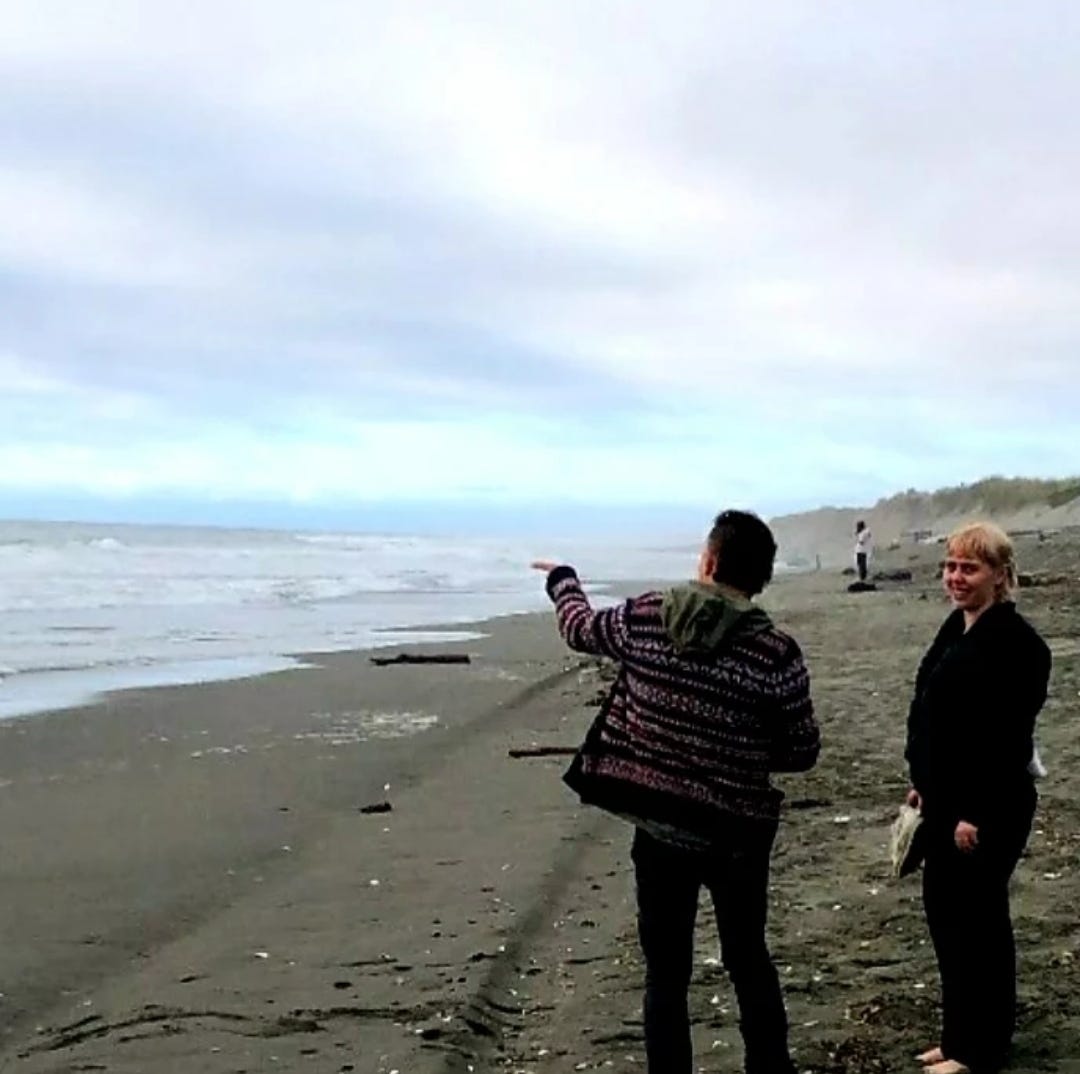
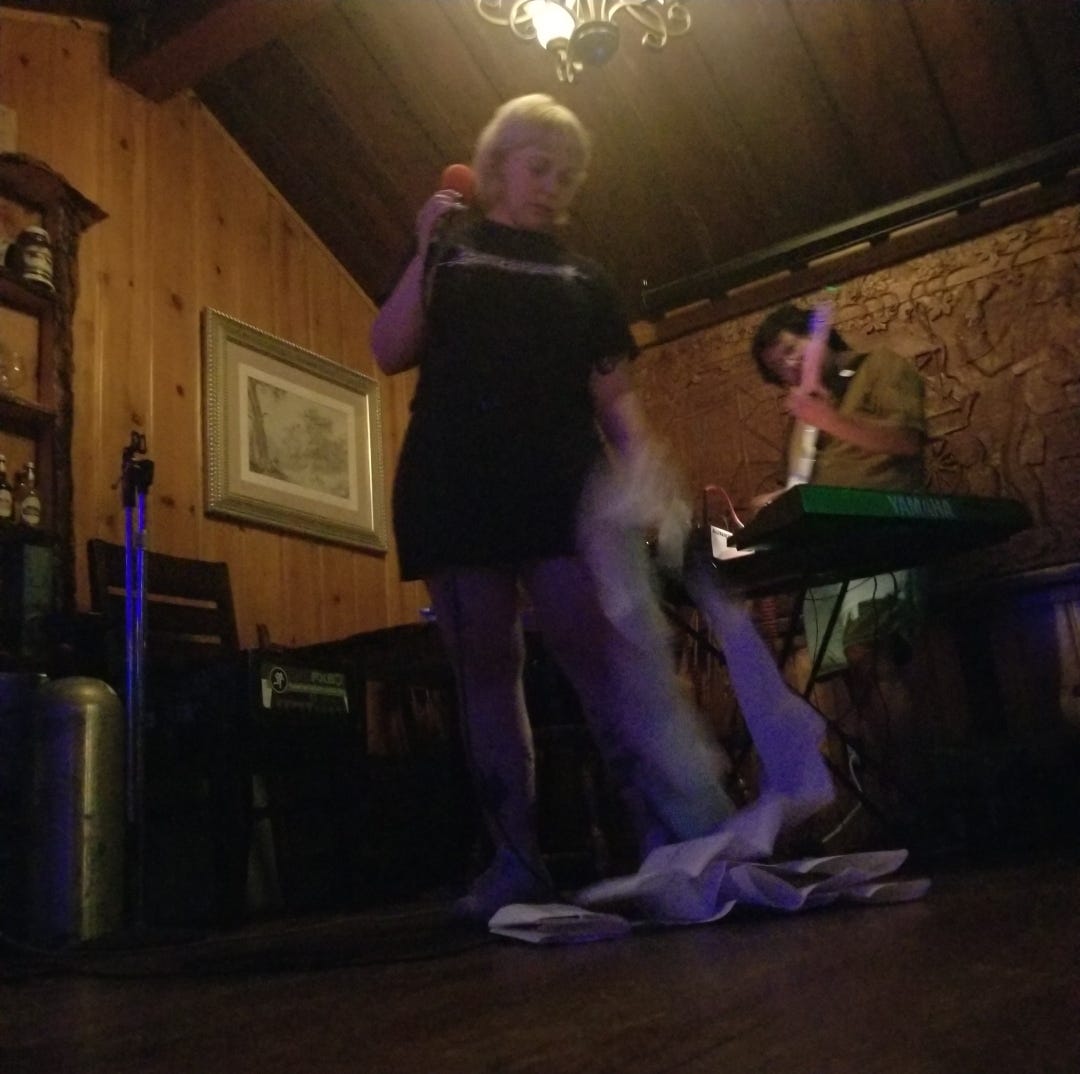
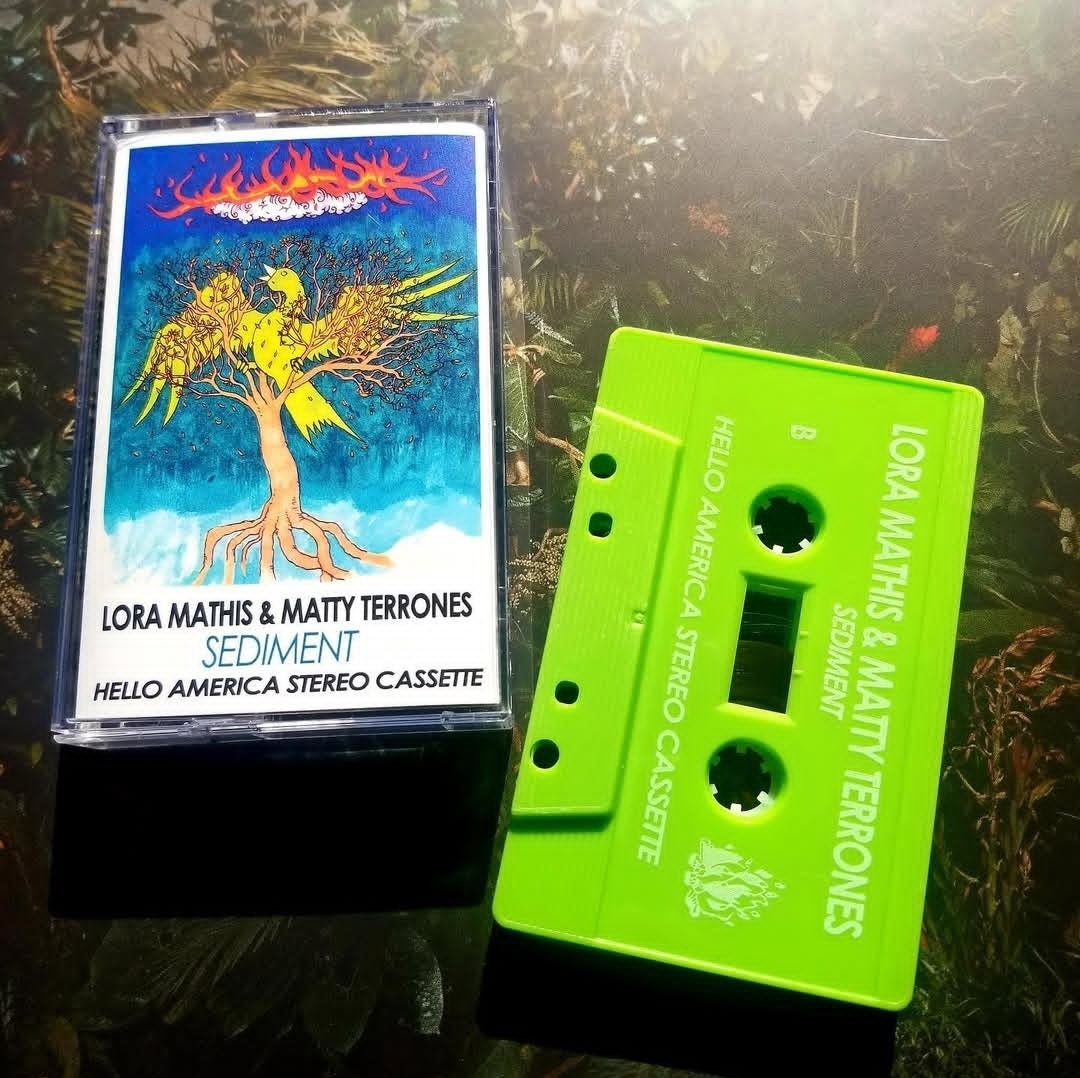

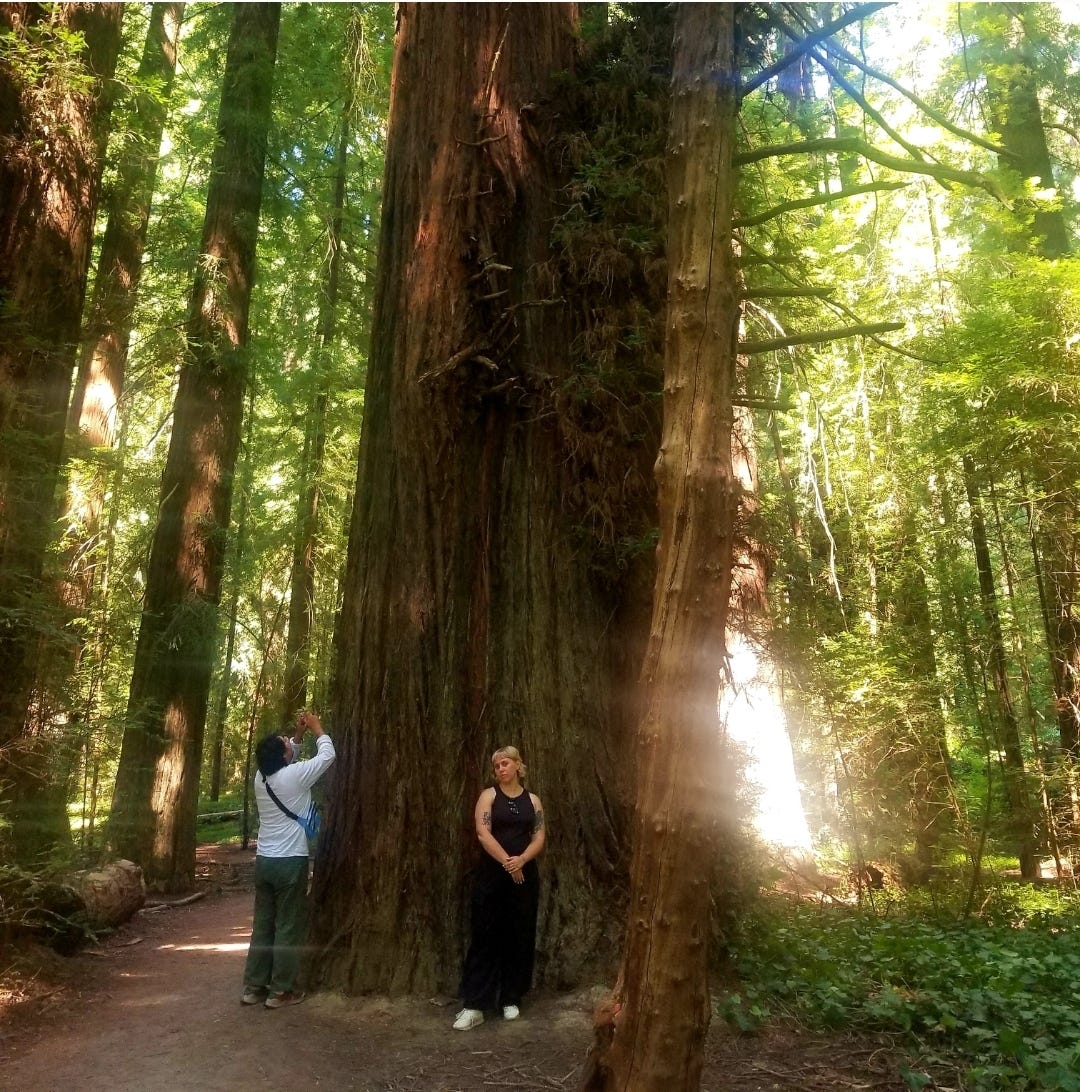
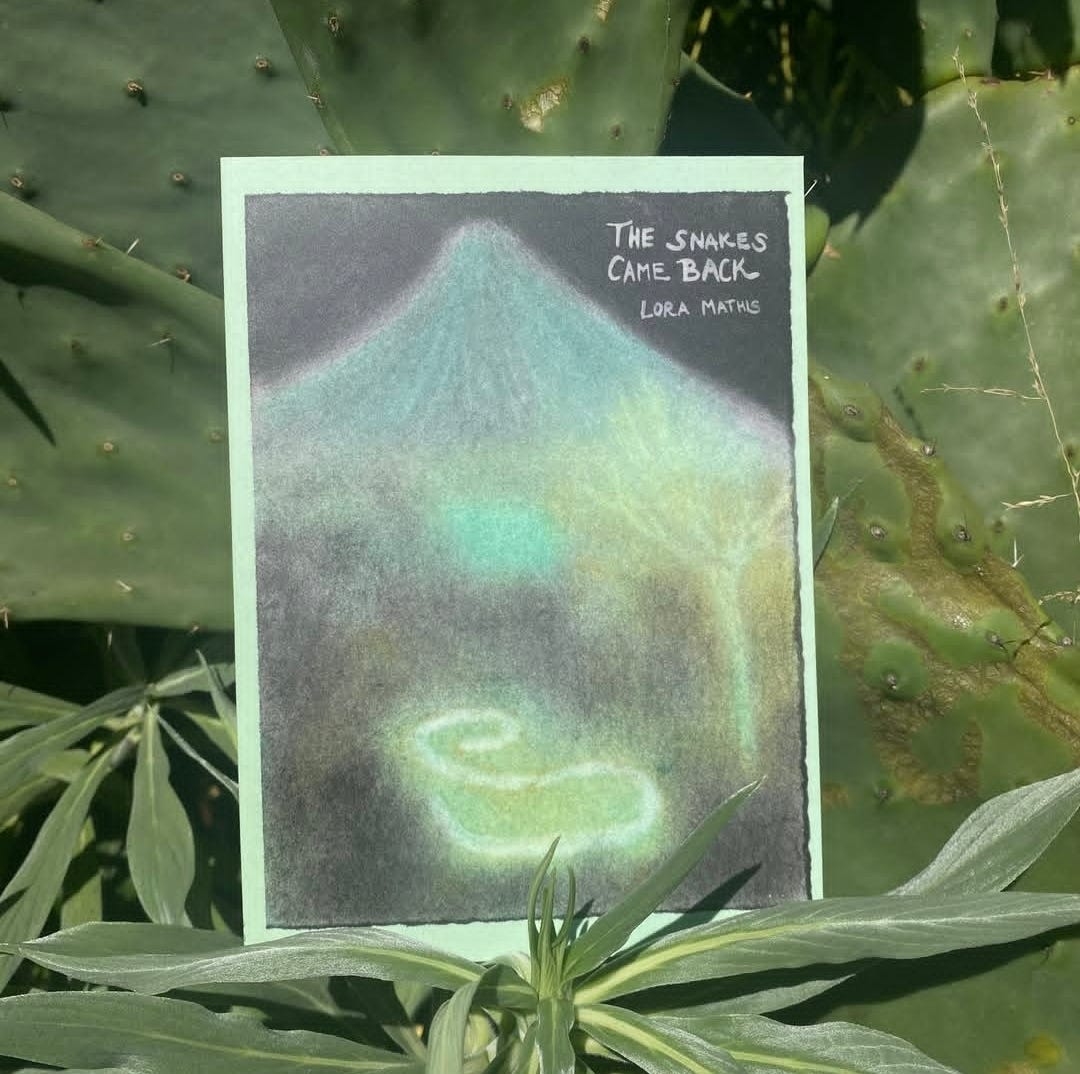
Also, follow Lora on here at https://lora.substack.com/